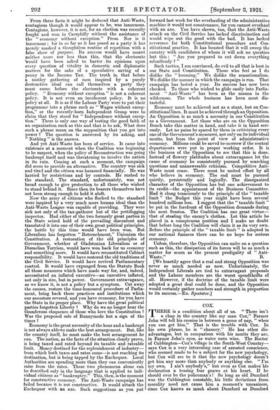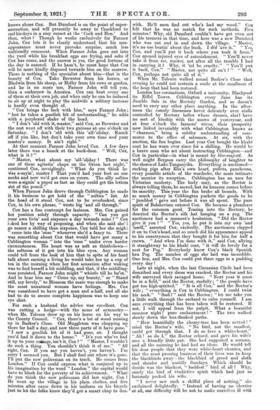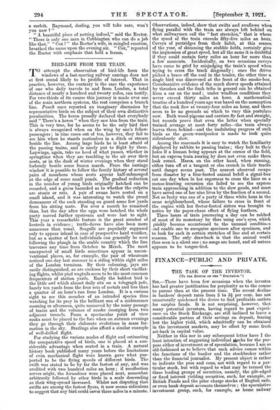COX. T HERE is a condition about all of us. "
There isn't a chap in the country like my man Cox," Farmer John will tell his cronies in between a game of nap, " when you can get him." That is the trouble with- Cox. In his own phrase, he is " chancey." He has other dis- advantages, but in comparison with his merits they are, in Farmer John's eyes, as water unto wine. The Rector of Oubbington—Cox s village in the South-West Country— says Cox is a very interesting case of arrested conscience, who seemed made to be a subject for the new psychology, but Cox will see to it that the new psychology doesn't get him any more than anybody or anything else. " I'm my own. I ain't anybody's," but even as Cox makes" his declaration 'a teasing fear gnaws at his heart.. If he should ever be the policeman's ! So long as old Dumford was the Cubbington constable, his little deviations from morality need not cause him a moment's uneasiness, since Cox knows as much about Dumford as Dumford knows about Cox. But Dumford is on the point of super- annuation, and will presently be away to Crackford to end his days in a rosy sunset at the Cock and Hen.' And then, what ? Though he works exclusively for Farmer John, Cox lets it be clearly understood that his non- appearance must never provoke surprise, much less unfriendly comment. When Farmer John goes out into the yard while his breakfast eggs are frying, and asks if Cox has come, and the answer is yes, the good fortune of the day is assured. If he hasn't, he must hope that Cox will be more kindly disposed towards him on the morrow. There is nothing of the specialist about him—that is the beauty of Cox. Take Brewster from his horses, or Bladwin from his sheep, or Holby from his cows or garden, and he is no more use, Farmer John will tell you, than a corkscrew in America. Cox can beat every one of them at their own job, and when only he can be induced to sit up at night to play the midwife a solitary increase is hardly even thought of. " Cox brings the luck with him," says Farmer John ; " but he takes a goodish bit of understanding," he adds with a perplexed shake of the head.
" I don't 'old with it, master," said Cox, as Brewster and the rest went off with their two guineas at one o'clock on Saturday. " I don't 'old with this 'alf-'oliday. Knock off if you like, but don't take your own time and your master's money. It ain't right." At that moment Farmer John loved Cox. A few days later there was a knock at the back-door. " Well, Cox, what is it ? "
" Master, what about my 'alf-'otiday ? There was one of these agitatin' chaps on the Green last night," continued Cox, inveiglingly. " What do you think he was a-sayin', master ? That you'd had your feet on our necks and now we'd got ours on yourn. The silly softies were a-signin' a paper as fast as they could get the letters out of the pencil."
When Farmer John drove through Cubbington he made it his business to get hold of the " softies " list. At the head of it stood Cox, not to be overlooked, since Cox, in his own phrase, " wrote big 'and all through." dox.has a fine contempt for laziness. Mrs. Cox gained her position solely through capacity. " Can you get your own livin' and sixpence a day towards mine ? " Cox raked her by way of, proposing, and when she said she'• I go nearer a shilling than sixpence, Cox told her she migh " come into the 'one " whenever she'd a fancy to. There was something about Cox that would have got many a Cubbington woman " into the 'ouse " under even harder circumstances. His heart was as soft as thistledown— the softness of it got into his blue eyes. Any woman could tell from the look of him that in spite of his hard talk about earning a living he would take her up a cup of tea in the morning when her first sensation after waking was to find herself a bit middling, and that, if the middling- ness persisted, Farmer John might " whistle till he bu'st." And to hear him say " Come up, my beauty," or " Stand still, my lovely," to Blossom the mare was enough to make the most unnatural woman have feelings. Mrs. Cox was considered to have got a man and a-half, and all she had to do to secure complete happiness was to keep one eye shut.
For such a husband the advice was excellent. Cox was cutting a hedge—with the acme of symmetry— when Mr. Toleson drew up on his horse on his way to the County Council. " Cox, there's a lot of wood missing up in Barker's Close. Old Muggleton was chopping up there for half a day, and now three parts of it have gone." " I saw a goodish bit of it had gone, sir. I thought you'd had it down to the house." " It's you who've had it up to your coitage, isn't it, Cox ? " " Master, I wouldn't do such a thing. You shouldn't think it of me." " All right, Cox. If you say you haven't, you haven't. I'm sorry I accused you. But I shall find out where it's gone. I'll put the new policeman on its track. He comes from London." If Cox could express what is conjured up in his imagination by the word " London " the capital would have to blush for the poverty of its achievement. " What do you think the new policeman did last night, Cox ? He went up the village in his plain clothes, and five minutes after came down in his uniform on his bicycle just to let the folks know they'd got a smart chap to des. with. He'll soon find out who's had my wood." Cox felt that he was no match for such methods. Five minutes ! Why, old Dumford couldn't have got even out of his trousers in that time, and here was a new Dumford who was out and in and down the village. " Master, it's no use beatin' about the bush. I did 'ave it." " Yes, Cox, and you'll put it back where you took it from." Cox opened injured eyes of astonishment. " You'll never take it from me, master, not after all the trouble I had in carrying it I Why, it 'ud be cruelty." " You'll put it back, Cox." " Master, not quite all on't ? " " Well, Cox, perhaps not quite all of it." When Mr. Toleson walked round Barker's Close that evening he could not restrain a smile at the smallness of the heap that had been restored.
London has coronations, Oxford a university, Blackpool its Eiffel Tower. Cubbington every June has its Jumble Sale in the Rectory Garden, and so doesn't need to envy any other place anything. In the after- noon the county finenesses hover delicately over stalls controlled by Rectory ladies whose dresses, alas I have no sort of kinship with the snows of yesteryear, and at four o'clock the farmers' wives, their prosperity now linked invariably with what Cubbington knows as " charmoo," bring a subtler understanding of com- merce to the office of salesmen. At six, with the auction, the fun begins. Last year Cox bought the khaki coat he has worn ever since for a shilling. He would be a brave man who set about instructing Cubbington—and Cox in particular—in what is meant by lise-majeste. As well might Bergson carry the philosophy of laughter to the shores of Lake Tanganyika. Everything is auctioned— sucking pigs after Elia's own heart, pullets, pantheons, every possible article of the wardrobe, the more intimate the merrier its reception. Cubbington has no uses for Victorian modesty. The body may, as the Rector is always telling them, be sacred, but its humour comes before its sanctity. This year the fun broke all bounds. With so much money in Cubbington pockets the goods to be " jumbled " gave out before it was all spent. The pure spirit of Bolshevism entered Cox. He became a plunderer for the common good. Tearing into the Rectory, he descried the Rector's silk hat hanging on a peg. The auctioneer had a moment's hesitation. " Did the Rector give 'it you ? " "Yes, yes, he put it into my own 'and 'isself," asserted Cox, excitedly. The auctioneer clapped it on to Cox's head, and so much did his appearance appeal to his countrymen that they bought it for him for half a crown. " And when I'm done with it," said Cox, allying it straightway to his khaki coat, " it will do lovely for a nest for Peg." Everybody knew Cox's black Spanish hen Peg. The number of eggs she laid was incredible. One hen, and Mrs. Cox could put three eggs in a pudding every day ! Late at night, when the last Circassian Circle had been described and every dress was cracked, the Rector and his wife surveyed their ravaged home. " Next year it must be in a field," said the Rector, ruefully ; "the people have got too high-spirited." " It is all Cox," said the Rector's wife; " everything is Cox in Cubbington. I could twist his neck." SBA I " said the Rector ; " let me take you a little walk through the orchard to calm yourself. I am sure everything that has been taken will be restored. If not, I will appeal from the pulpit. What a beautiful summer night ! pure enchantment ! " The two walked slowly down the box-flanked paths.
" How beautifully the cherry-tree has been netted I " cried the Rector's wife. " No bird, not the smallest, could get through that. I do so love a white-heart:" " Ah ! so do I," the Rector echoed, and gave his wife's arm a friendly little pat. She had suggested a sermon, and all the morning he had had no ideas. He would tell his dear people that they were white-heart cherries, and that the most pressing business of their lives was to keep the blackbirds away—the blackbird of greed and sloth and slander and worldly Sundays. Which should he decide was the blackest, " baddest " bird of all ? Why, surely the bird of vindictive spirit which had just so furiously pecked his wife.
" I never saw such a skilful piece of netting," she exclaimed delightedly. " Instead of having no cherries at all, our difficulty will be not to make ourselves ill with a surfeit. Raymond, darling, you will take care, Won't you now ? " " A beautiful piece of netting indeed," said the Rector. " There is only one man in Cubbington who can do a job like that." " Cox ? " the Rector's wife, in mingled emotion, breathed the name upon the evening air. " Cox," repeated the Rector with emphasis that held a lesson.




































 Previous page
Previous page